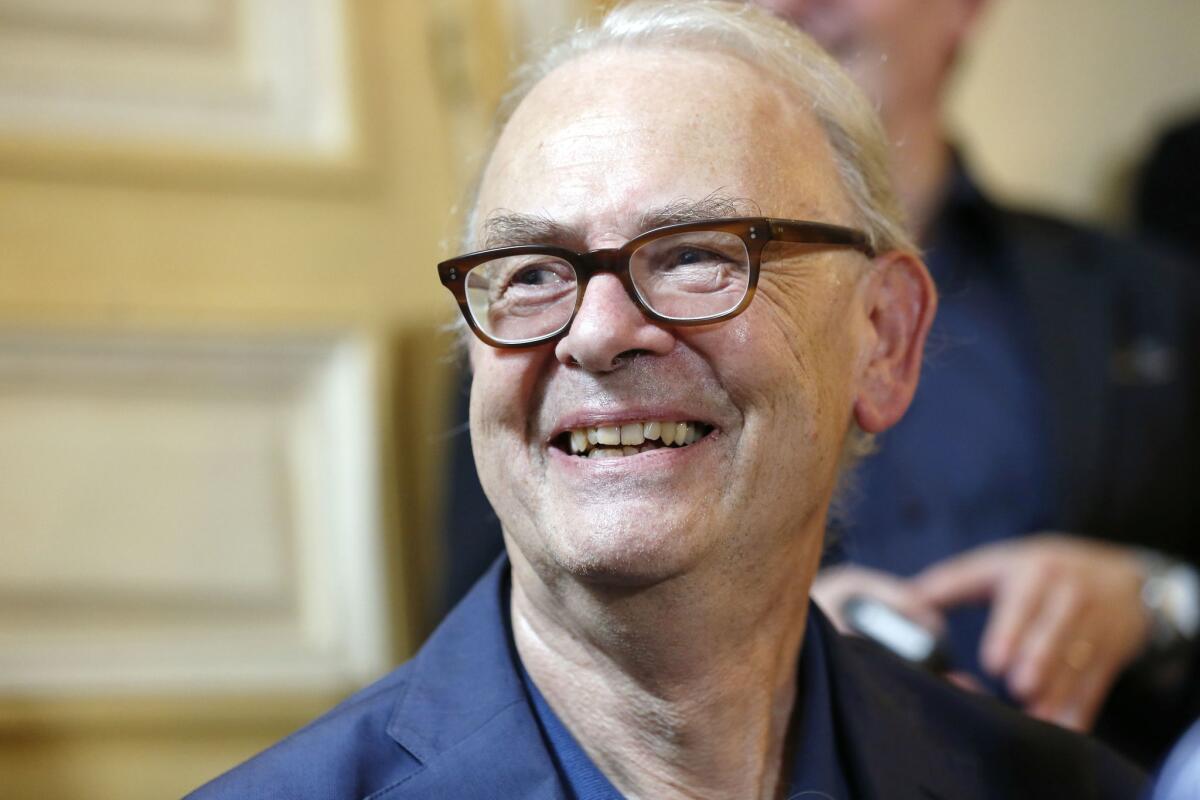Patrick Modiano, the Nobel Prize and what (if anything) it means

We’ve read this story before: the contentious interview with the representative of the Swedish Academy, followed by the awarding of the Nobel Prize in literature to a European writer, largely unknown in the United States, who specializes in work that is small, interior, elliptical. Six years ago, it was Jean-Marie Gustave Le Clezio; this time, it is Patrick Modiano, author of more than 30 books, although only about a third have been translated into English.
Is there a message here? That point has been argued, somewhat ludicrously, by Emma Brockes, who suggested Thursday in the Guardian that the intention of the Nobel judges may be to snub Philip Roth in the most public way imaginable, as if the prize itself were little more than an elaborate put-on.
“For years, the story goes,” Brockes writes, “Roth would actually make the trip into New York to wait in his agents’ office for the call, a rough publicity schedule ready to be printed and activated. There he would sit, in a meeting room presumably prepared with refreshments, and at the end of the day, make the long, sad trip back to Connecticut. Charlie Kaufman could get a terrific movie out of this.”
I don’t doubt that Roth lusts for the Nobel -- the one major literary award he hasn’t won -- but this story seems to me apocryphal.
It is also, I should hardly need to point out, irrelevant, the expression of a tired trope. Why? The most obvious reason is its insistence on an American, or English-language, hegemony -- a kind of literary imperialism, let’s say.
But even more, it overlooks the possibility that Modiano is deserving of the prize. I say possibility because, like many readers outside of France, I am largely unfamiliar with his writing, although what I’ve seen appears profound and engaged.
Here he is in the opening sentences of his 1978 novel “Missing Person”: “I am nothing. Nothing but a pale shape, silhouetted that evening against the cafe terrace, waiting for the rain to stop; the show had started when Hutte left me.”
“Missing Person” is a kind of backwards detective story -- the saga of an investigator on the trail of his own identity. Such themes, apparently, occupy the soul of Modiano’s writing; “his great subject,” Michael Wood wrote in 2000 in the London Review of Books, “is not passing time but missing persons.”
That makes sense, given his history; born in 1945, he grew up estranged from his father, who, it is said, made his money on the black market during the Vichy years. Their relationship was toxic enough that when Modiano’s first novel, “La Place de l’Etoile,” came out in 1968, his father tried to buy up all the copies, so much did he hate the book.
In a 2010 interview, Modiano referred to himself as “a product of the dunghill of the Occupation, that bizarre time when people who should have never met did meet and by chance produced a child.” What he’s referring to is not just loss but an outright disconnection from history, personal or otherwise. “Like everyone who has neither ground nor roots, I am obsessed by my prehistory,” Modiano has observed.
“Missing Person” is a case in point, as is his 1997 novel “Dora Bruder,” which interposes autobiographical elements with the fictional re-creation of a young Jewish girl who disappeared in 1941. How can we have a relationship to time, to identity, he is asking, when both time and identity are composed of fragments, and there is no way for us to make them coalesce?
None of this is meant to overlook the Swedish Academy’s continuing Eurocentric tilt, embodied by (to my mind) its inexplicable neglect of the Kenyan writer Ngugi Wa Thiong’o. “Almost 70 percent of all the literature laureates have been born in Europe,” Ron Charles observes in the Washington Post, which is an appalling statistic by any measure.
Since 2004, eight of 11 laureates have been European, and the others (Peru’s Mario Vargas Llosa, Canada’s Alice Munro, and even Mo Yan, who is something of an officially sanctioned artist in his native China) are hardly representative of the developing world.
What this has to tell us, then, is that the Swedish Academy, and by extension the Nobel, is as insular as anything it may seek to stand against.
And yet, what do we expect? Prize juries are by their nature imperfect, composed of individuals, underlain with biases, acknowledged or otherwise. The very idea of giving awards for art, for literature, is antithetical, framing it as a contest, when in fact it is a collective exercise. “Good writing glories all writers,” the critic Malcolm Cowley once argued. “You are not in competition.” We read many kinds of books for many reasons, and there is no one-size criteria that fits them all.
In that sense, the selection of Modiano is perhaps most usefully regarded on its own terms. Certainly, identity, history, is the great subject of modernity, a reflection of the rootlessness so many of us feel. Cut loose from the past, staring down a future that is anything but certain, we are left with nothing but our evanescence, the overwhelming sense that there is nothing for us, that we cannot even, in any real way, say who we are.
That’s true, I think, no matter where you come from; it’s an experience we all recognize. “It takes time for what has been erased to surface,” Modiano has written. “But I am a patient man. I can wait for hours in the rain.”
Twitter: @davidulin
More to Read
Sign up for our Book Club newsletter
Get the latest news, events and more from the Los Angeles Times Book Club, and help us get L.A. reading and talking.
You may occasionally receive promotional content from the Los Angeles Times.









